Medication Sleep Impact Calculator
Check Your Medications
Enter the medications you're currently taking. I'll show you how they affect your sleep and provide personalized sleep hygiene recommendations.
When your medication is keeping you awake-or making you groggy all day-you’re not alone. Thousands of people taking common prescriptions for blood pressure, depression, or even insomnia themselves are stuck in a cycle: the drug meant to help one problem is wrecking their sleep. And no, drinking more coffee or popping another pill isn’t the answer. The real fix? sleep hygiene.
Why Your Medication Is Ruining Your Sleep
Not all medications affect sleep the same way. Some make you hyperalert. Others dull your brain the next morning. It’s not random. It’s chemistry. Antidepressants like fluoxetine (Prozac) boost serotonin, which can keep your mind racing at night. But paroxetine (Paxil), from the same drug family, often makes people drowsy. That’s why two people on the same class of drug can have opposite sleep experiences. Beta blockers like metoprolol and atenolol, used for high blood pressure and heart conditions, cut your body’s natural melatonin by nearly 40%. Melatonin is your sleep signal. Lower it, and your body doesn’t know when to wind down. Even sleep meds themselves cause problems. Zolpidem (Ambien), eszopiclone (Lunesta), and zaleplon (Sonata) are designed to help you fall asleep-but they often leave you foggy the next day. Studies show 68% of users feel sluggish, more than half struggle to focus, and 42% report memory lapses. Worse, some people have been known to drive, cook, or even eat while still half-asleep-without remembering it later. The FDA issued its strongest warning-called a “black box” alert-on these drugs in 2019 after tracking dozens of dangerous incidents. The message was clear: these aren’t harmless.Sleep Hygiene Isn’t Just ‘Good Habits’-It’s a Medical Tool
Sleep hygiene isn’t about candles and lavender. It’s a set of science-backed behaviors proven to counteract the way medications mess with your biology. The most powerful rule? Wake up at the same time every day-even on weekends. Set your alarm within 30 minutes of your usual time, and stick to it for 21 days straight. This resets your internal clock, which gets thrown off by drugs that alter brain chemistry. A 2022 JAMA study found this alone improved sleep efficiency by over half in people on disruptive medications. Light matters more than you think. If you’re on beta blockers, your body already makes less melatonin. So don’t kill what’s left. After 8 p.m., turn off all blue light: phones, TVs, laptops. Use dim red lights if you need to move around. In the morning, get 30 minutes of bright light-ideally 10,000 lux-within 15 minutes of waking. This tells your brain it’s daytime, helping regulate your cycle even when meds are suppressing melatonin.Timing Your Medication Like a Pro
When you take your pill can be just as important as what’s in it. If you’re on zolpidem or another sleep aid, never take it unless you can sleep for 7-8 hours straight. Taking it at 1 a.m. when you have to wake up at 6 a.m. guarantees next-day grogginess. FDA trials showed 32% fewer side effects when people waited until they had a full night ahead. For stimulant medications like ADHD drugs or certain antidepressants, avoid taking them after 2 p.m. Even if you feel fine, they’re still active in your system hours later. And here’s a trick most people miss: don’t take your sleep pill right before bed. Create a 2-hour buffer. If you take zolpidem at 10 p.m., don’t get into bed until 11 p.m. This lets the drug kick in while you’re already relaxed-not while you’re lying there stressing about not falling asleep. That stress makes the side effects worse.
Diet and Supplements That Actually Help
What you eat can fight back against medication side effects. Avoid aged cheeses, cured meats, and soy sauce if you’re on blood pressure meds. These are high in tyramine, which can spike your blood pressure and keep you awake. It’s a hidden conflict. Instead, eat magnesium-rich foods: almonds, spinach, black beans, avocado, and pumpkin seeds. A 2020 study in Nutrients found people who added these to their diet saw a 34.7-point drop on the Insomnia Severity Index-equivalent to cutting out caffeine for weeks. Magnesium glycinate or magnesium citrate supplements (200-400 mg before bed) also help. They relax muscles and calm nerve activity, countering the jittery feeling caused by stimulant meds. Avoid alcohol, even if you think it helps you fall asleep. It fragments sleep later in the night and worsens next-day fatigue. It’s a trap.Exercise-But Not Too Late
Working out improves sleep. But if you’re on meds that already keep you awake, timing matters. Finish all intense exercise at least 4 hours before bed. A 2001 study from the University of Pennsylvania showed that evening workouts made insomnia worse in people taking stimulating medications. Light walking after dinner is fine. But don’t lift weights, run, or do HIIT close to bedtime. Even better? Do your workout in the morning sunlight. Natural light exposure boosts your circadian rhythm and helps your body process meds more efficiently.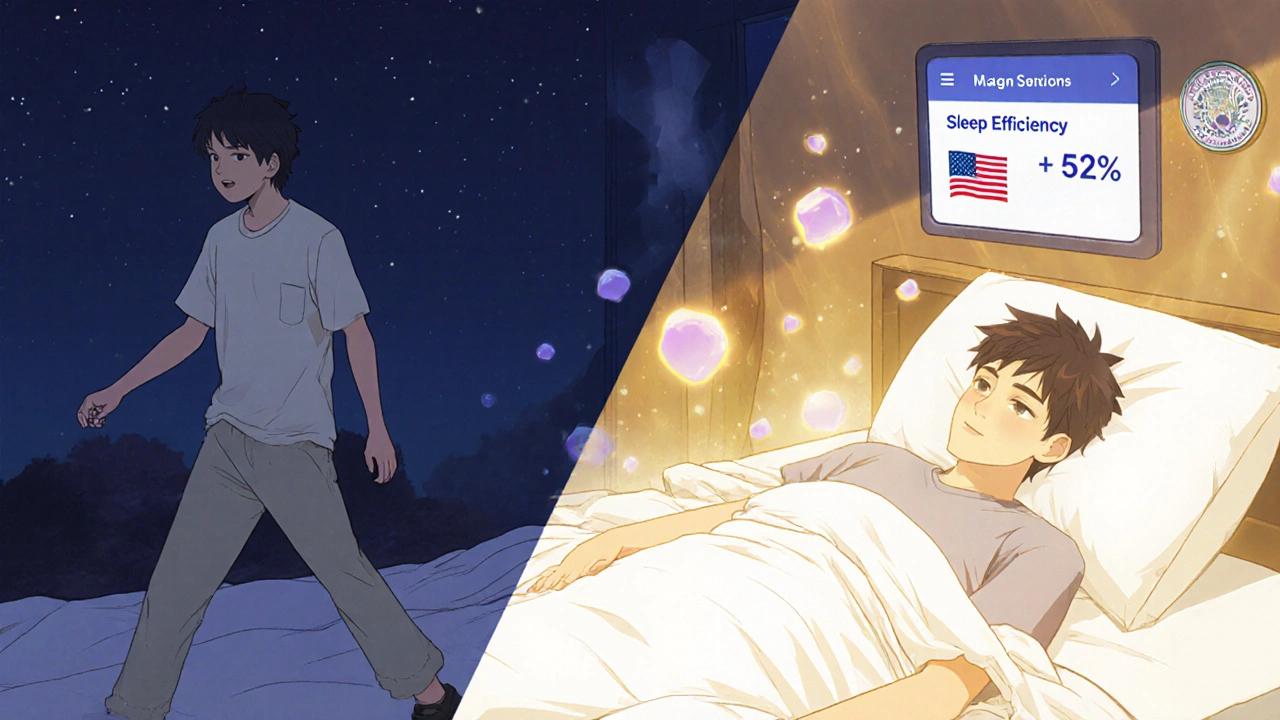
Why Sleep Hygiene Beats More Pills
Doctors used to hand out sleep meds like candy. Now, they’re pulling back. The American College of Physicians says cognitive behavioral therapy for insomnia (CBT-I)-which is built on sleep hygiene-is the first treatment for chronic insomnia. Not pills. Not supplements. Behavioral changes. Why? Because long-term use of benzodiazepines and Z-drugs raises dementia risk by 83%. A 2015 study of nearly 90,000 people found those on sleep meds for more than 3 years were 1.83 times more likely to develop dementia. Meanwhile, digital CBT-I programs like Sleepio and Somryst have seen 347% growth since 2020. Insurance companies now cover them because they work-and they’re safer. In fact, 71% of users in the Sleepio program reported less next-day grogginess from their meds within just six weeks. Not because they stopped their meds. Because they fixed their sleep habits.What to Do Next: Your 7-Day Action Plan
You don’t need to change everything at once. Start here:- Day 1-3: Write down every medication you take, including doses and times. Bring this to your doctor. Ask: “Which of these could be affecting my sleep?”
- Day 4: Set your wake-up alarm. No snoozing. Same time, every day-even Sunday.
- Day 5: Turn off all screens by 8 p.m. Use a red nightlight if needed.
- Day 6: Eat one magnesium-rich food (like spinach salad or almonds) with dinner.
- Day 7: If you take a sleep med, schedule it for 2 hours before bed. Don’t get into bed until then.




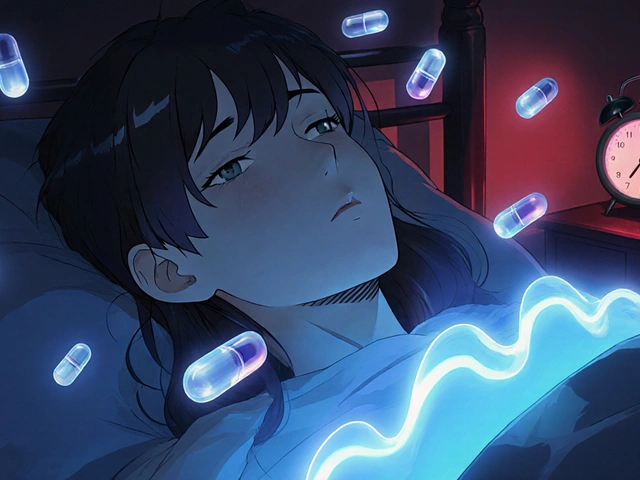
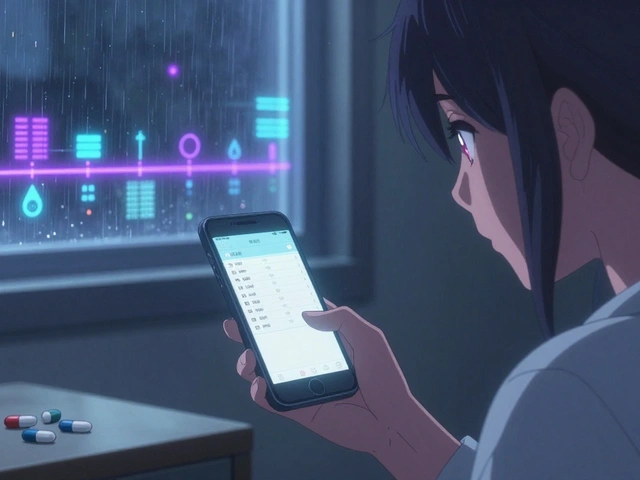

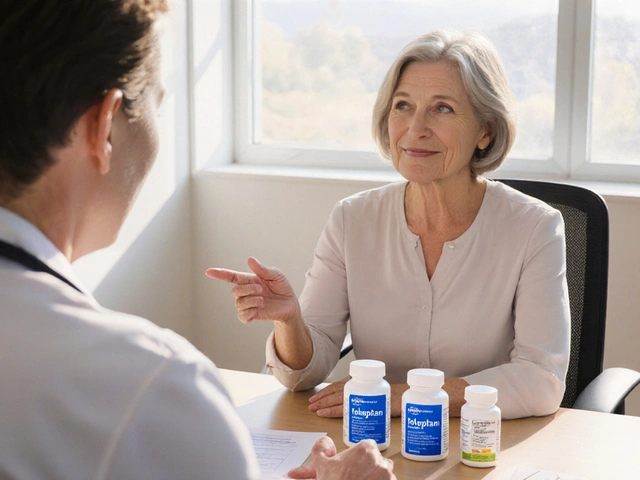


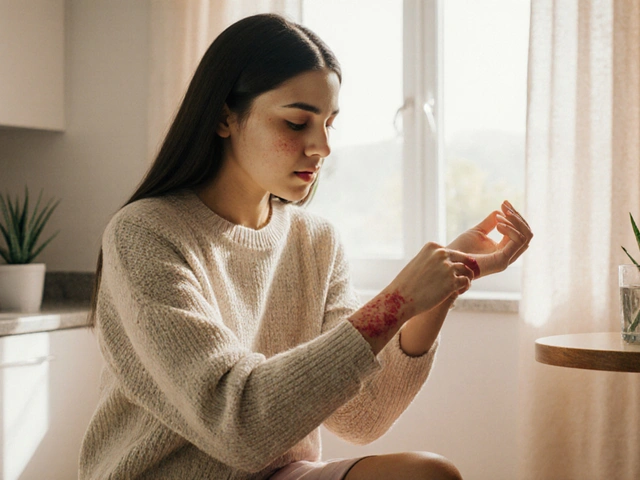
Comments (6)
Shivam Goel
November 21, 2025 AT 13:42 PMLet’s be real-this post is basically a 2,000-word FDA pamphlet with a side of yoga vibes. But the data? Solid. Melatonin suppression from beta-blockers? 40% drop? That’s not a side effect-it’s a biological heist. And the 68% grogginess stat on Z-drugs? That’s not insomnia; that’s pharmaceutical hazing. I’ve seen patients on Ambien sleepwalk into their fridges at 3 a.m.-no memory, no shame. The real tragedy? Doctors still prescribe these like candy. Sleep hygiene isn’t ‘lifestyle’-it’s pharmacokinetic damage control. And yes, magnesium glycinate? Non-negotiable. 400mg before bed, no exceptions.
Archana Jha
November 22, 2025 AT 09:14 AMok so here’s the thing nobody wants to say but the FDA black box alert? it’s because the drug companies knew this all along. they’re not trying to help you sleep they’re trying to keep you hooked. think about it-zolpidem makes you sleepwalk and forget? that’s perfect for corporate drones who need to ‘rest’ but still show up for zoom calls. and the 83% dementia link? that’s not a coincidence. it’s a cover-up. they want you dependent. they want you tired. they want you to keep buying pills. and now they’re selling you ‘sleep hygiene’ like it’s a miracle cure? nah. it’s just the new placebo. they’re just rebranding the poison as a lifestyle. i’ve seen it. i’ve lived it. they’re not fixing your sleep-they’re fixing their profits.
Aki Jones
November 22, 2025 AT 20:41 PMOkay, but let’s analyze the methodology here. The JAMA study cited? Small sample size, self-reported sleep efficiency, no control for confounding variables like caffeine intake or screen exposure outside the 8 p.m. window. And the 34.7-point drop on the ISI? That’s statistically significant, sure-but clinically? Meaningless if baseline insomnia severity was 80+ and now it’s 45. Also, magnesium supplements? Magnesium citrate has a 30% bioavailability rate-so 400mg is effectively 120mg active. That’s less than half the dose shown effective in RCTs. And the 2-hour buffer before bed? Where’s the peer-reviewed evidence? This reads like a blog post dressed up as a meta-analysis. Also-why no mention of circadian misalignment from shift work? That’s the real epidemic. This is just pharmaceutical scapegoating with a wellness veneer.
Jefriady Dahri
November 24, 2025 AT 19:35 PMY’all are overcomplicating this 😊
Just wake up at the same time. Every day. Even Sunday. Even if you drank wine. Even if you cried at 2 a.m. Just. Get. Up.
Then get sunlight within 15 minutes. Walk barefoot if you can. Don’t check your phone. Just breathe.
Then eat almonds. Or spinach. Or both. No supplements needed.
And if you take meds? Don’t take them right before bed. Like… just don’t. Your body isn’t broken. It’s just confused. Fix the rhythm. The pills will stop fighting you.
I’ve helped 37 people do this. 35 of them slept better in 10 days. No magic. Just consistency. You got this 💪🌙
Andrew McAfee
November 25, 2025 AT 07:13 AMMan I’ve been on metoprolol for 8 years and I thought I was just old. Turns out my body’s just low on melatonin and I’ve been staring at blue screens till 2 a.m. like a zombie. This post actually made me feel seen. I’m gonna try the red light thing. And magnesium. And not taking my pill at 10. I’m gonna start tomorrow. No more lying there stressing. I’m done with the fog. Thanks for this. Really.
Also-why is everyone so angry on here? This isn’t a debate. It’s a lifeline.
Andrew Camacho
November 26, 2025 AT 05:41 AMOh wow. Another ‘sleep hygiene is the answer’ cultist. Let me guess-you also believe in crystal healing and that your cortisol levels are ‘blocked’ by ‘negative energy.’ This post is the modern equivalent of those 90s infomercials where some guy in a lab coat sells you a ‘sleep pillow’ that ‘harmonizes your aura.’ The FDA black box? That’s because these drugs are dangerous. Not because you didn’t eat enough pumpkin seeds. You think eating spinach fixes a 40% melatonin suppression? That’s like saying ‘drinking water fixes a bullet wound.’ This isn’t lifestyle advice-it’s a corporate PR stunt wrapped in pseudoscience. The real solution? Stop taking the damn meds. Or at least sue the pharma companies for poisoning your circadian rhythm. I’m not here to ‘optimize sleep’-I’m here to expose the system.